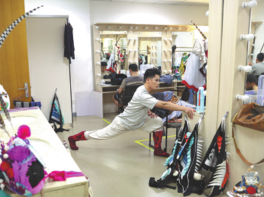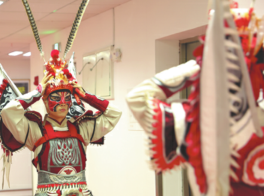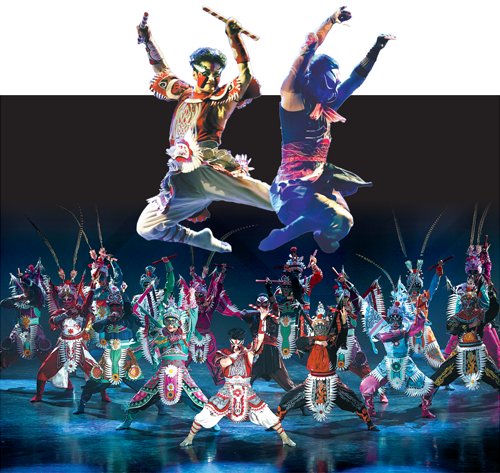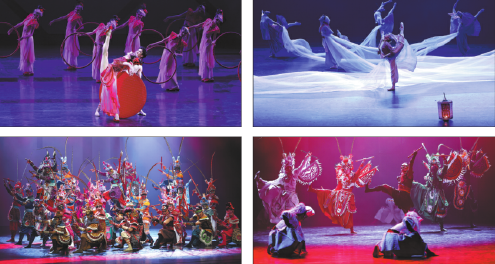Dance drama shares iconic Lingnan culture
Production blends movement and emotion in a poignant exploration of personal and collective memory, Chen Nan reports.

In a striking fusion of tradition and innovation, Odes to Heroes, a Chinese dance drama by the Guangzhou Song and Dance Theatre, brings to the stage a heartfelt narrative that merges two iconic elements of Lingnan culture: the historical art of qiaopi letter-writing and the captivating yingge dance.
Rooted in the rich heritage of the Lingnan region in southern China, particularly Guangdong province, these traditions intertwine to tell a timeless story of love, separation and reconnection.
Since its premiere last year, Odes to Heroes has been staged 38 times across China, including a series of performances at the Beijing Tianqiao Performing Arts Center from July 31 to Aug 2, following its debut at the 7th China Xinjiang International Dance Festival in Urumqi, capital of Northwest China's Xinjiang Uygur autonomous region.
The production will continue its nationwide tour through the end of this year, with upcoming shows in cities including Lanzhou in Gansu province, Shanghai, and Nanjing in Jiangsu province.
The drama is a blend of movement and emotion, with the dancers' graceful yet powerful gestures telling a story that transcends words.
Co-directed by Qian Xin, the production not only celebrates the aesthetic beauty of traditional dance but also delves into themes of identity, loss and the longing for reconnection. The emotional weight of qiaopi — letters sent by overseas Chinese migrants to their families — intertwines seamlessly with the dynamic energy of yingge dance, evoking a poignant exploration of personal and collective memory.
The qiaopi tradition emerged in the 19th and 20th centuries, when emigrants from Guangdong and Fujian sent these letters, along with remittances, to their families back home. The letters were not just messages, but emotional lifelines that conveyed both financial support and a profound yearning to reunite.
Set in the late 1930s, the drama follows a moving family story. A father leaves his home to seek work in Southeast Asia, only to vanish without a trace. The mother, resolute but heartbroken, raises their son, with tireless love and sacrifice.
One night, during Lantern Festival, the son strikes the yingge mallet — a relic left behind by his father. This act transports him into a surreal, dreamlike world, where chaotic sights and sounds overwhelm him. Amid the turmoil, the son begins to understand the struggles and unspoken sacrifices of his father, while also embarking on a journey of self-discovery and personal growth.
"At its core, the dance drama is a tale of generational memory, loss and the longing for reunification," director Qian says.
"From the moment the stage lights flicker on, the audience is transported into the world of Lingnan region, where the artistry of the yingge dance is elevated to new heights."
The yingge dance, or "dance to the hero's song", is a celebration of the triumph of good over evil, mostly popular in southern China. The dance form dates back to the Ming Dynasty (1368-1644) and merges traditional opera, dance and martial arts.
Performers wear opera-style facial makeup in different colors and patterns that reveal the personalities of the characters they are portraying. With a pair of short mallets in hand, they jump, swing, and hit the mallets together while walking and dancing, all to the resounding beat of drums, gongs and shouts.
In recent years, the old dance form has become a viral hit and attracted lots of tourists to cities of southern China to experience the unique culture.
In the dance drama, traditional moves, like the graceful hand gestures and sharp footwork, seamlessly intertwine with the beats produced by the mallets, captivating the audience with the blending of cultural history, personal memory, and the evolving nature of tradition.
A principal dancer of Guangzhou Song and Dance Theatre, Iiiwan Umar, 30, plays the role of the son in the dance drama.
"I've always felt that dance should not just be a display of technique, but a form of storytelling. I was inspired by the qiaopi letters that have been passed down through generations. These letters are more than just words on paper — they are a bridge between worlds," he said in Beijing on July 31.
"When I learned yingge dance with senior performers from the Lingnan region, I admired their passion and respect for the old dance form, each step symbolizing an emotion."
Liang Qiqi, a native of Guangdong, plays the role of the mother in the dance drama.
"I wanted to honor my heritage while also finding a way to bring something new to the table. Yingge dance is such a powerful, dynamic art form, but it can sometimes feel like it's locked in the past. I am very excited that the creative team has reimagined it, making it relevant for younger generations while still respecting its origins," she says.
According to Wang Sisi, co-director of the dance drama, Odes to Heroes is the last production of the trilogy produced by the Guangzhou theater company, highlighting traditional culture of the Lingnan region.
In 2018, the theater company premiered its dance drama Awakening Lion, which brings the traditional lion dancing into the limelight.
In 2021, it brought out Dragon Boat, which highlights the vibrant and deeply rooted traditional dragon boat racing culture tied to both history and local customs.





Today's Top News
- Foreign ministers of China, Egypt call for Gaza progress
- Shield machine achieves Yangtze tunnel milestone
- Expanding domestic demand a strategic move to sustain high-quality development
- Xi hears report from Macao SAR chief executive
- Xi hears report from HKSAR chief executive
- UN envoy calls on Japan to retract Taiwan comments






























